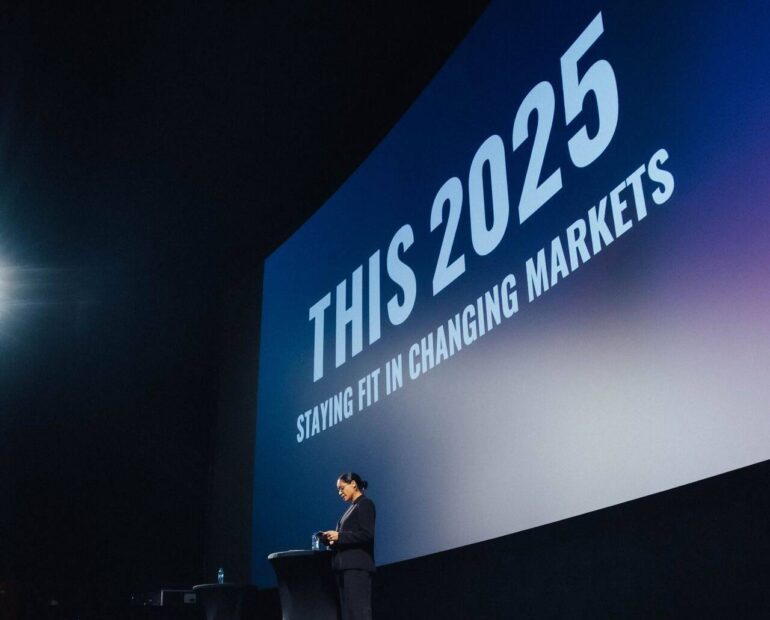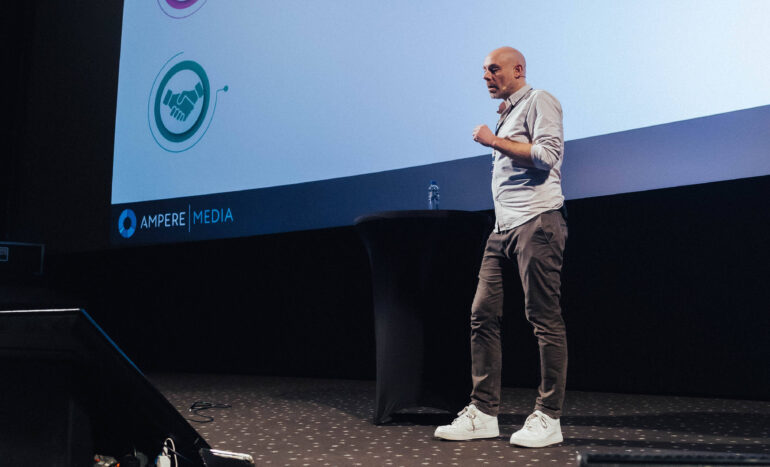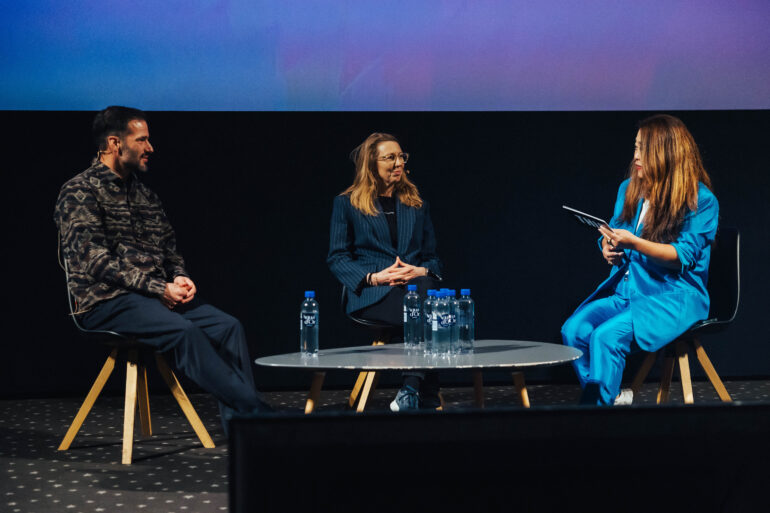Written by: Per Laursen
12.11.25
Broadcasters and streamers shared financing challenges and commissioning strategies at the 8th edition of the THIS festival in Århus, where the international market’s fast-developing trends were presented.
An unannounced theme emerged at THIS Series on 6 November: Nordic TV producers and broadcasters lack funding to deliver contemporary, high-quality scripted output that matches international storytelling and production values. According to key industry people, this might be the time to reconsider the existing funding system, for example, sharing feature film funds with the development and production of TV series.
“Are TV series just a product ordered by broadcasters or a cultural contribution, like film? It’s a paradox worth considering moving forward; after all, TV series reach far more people, yet funding programmes are almost entirely aimed at feature films. In fact, all institutions and programmes are named ‘Film’ something,” CEO Christian Rank, Miso Film Sweden, suggested.
TV 2 Denmark’s Content Director and COO, as well as interim Head of Drama, Lotte Lindegaard, acknowledged Rank’s point:
“TV series are not 'just' a product. Like feature films, the serial narrative is a culture-bearing product that brings us together and sparks conversations. But series as a genre needs stronger financial support if we are to maintain a sustainable industry, and the development of series that can match international titles,” Lindegaard added.
“It became clear that there is a need to focus on Danish and Nordic collaborations, on funding opportunities, and development spaces to ensure the culturally significant products that TV series represent,” Felicia Elisabeth Jackson, Festival Director for THIS, summarised on LinkedIn after the conference.
DR’s Head of Fiction, Henriette Marienlund, offered another perspective on the issue: There is a lack of budget to match the high production value from international players. “Our industry lacks funding. This includes DR in our own way. Total production costs are not getting cheaper. It’s worth an industry discussion; can we, on occasion, produce original, well-written drama less expensively than now? Is there a way to produce some of our projects at lower costs?”
During the day, AI was frequently introduced as the obvious way to secure high-quality content, writing, and locations at much lower costs; however, Head of Danish Film Directors, Søren Balle, was cautious. “It’s tempting, but don’t use AI to save one episode writer, for example, it will threaten the ecosystem of the production industry, and of course kick off many rights issues.”
Later, the struggle for financing, film and TV returned as a key issue, as Claudia Saginario, Creative Producer and partner at Uma Film; Piv Bernth, CEO, CCO, Creative and Executive Producer at Apple Tree Productions; Mia Marie Borup, producer at Nordisk Film Production; Misam Avaz, producer and partner at Forty-Five Films; and Peter Bose, producer and partner at Miso Film, sat down for a panel talk.
They highlighted that rising costs for crews and staff are a significant factor. The producers requested DR and TV 2 Denmark to increase their investments in film and series, emphasising that high production value is essential, especially when competing internationally. Producers will keep looking for ways to cut costs using LED sets and AI solutions to produce more efficiently.
The group of producers also agreed that it is becoming increasingly challenging to sell Nordic content internationally, with the exception of crime, for example Netflix’s The Asset (Legenden) and Secrets We Keep (Reservatet).
Once again, Ampere Analysis, specialising in film and TV trends, mapped out the key Nordic industry figures and trends shaping the markets. In general, global commissioning is down from the golden years, with a 2022 high.
“That said, Nordic commissioning has held up quite well, compared to global trends, until a sharp Nordic dip in early 2025,” Matt Trickett, Head of Media at Ampere Analysis, said.
“Nordic commissioning is still in reasonable shape, measured in the number of titles. Public broadcasters maintain their output since 2021-22, the drop is amongst commercial broadcasters.”
Trickett also pointed out that film and TV viewing on YouTube remains moderate in Northern European markets, but the next step is for Nordic broadcasters to engage with YouTube more strategically, not just as a marketing platform.
“Such as licensing episodes to YouTube, like ITV and Channel Four have done in the UK.”
As Ampere pointed out, the total Nordic output in scripted is in reasonable shape, which SVT, NRK, DR, and TV 2 Denmark proved at the traditional broadcaster session.
NRK has 15 scripted projects in various stages of development, and two series in production. “Slightly less than in the glory days,” Marianne Furevold, Head of Drama at NRK, admitted, while accentuating the need for many projects in development to secure an interesting output.
SVT averages 8-9 new series per year, and has approximately 50 projects in various phases of paid development. “There are currently four projects in production, with two more to commence production in 2026,” Johanna Gårdare, Head of Drama and Film at SVT, said.
TV 2 Denmark has fewer titles in development than usual. “We may have had too many projects in development, but we will reach 7-8 productions per year. TV 2 currently has four in production, and expects a record of 11 in production next year,” Lotte Lindegaard, CCO at TV 2 Denmark, promised.
DR has 10 projects in development, but a smaller slate than its Nordic colleagues. “We premiere 3-4 new series per year, not including scripted shows for children, youth, and docudramas,“ Henriette Marienlund said.
Representing the always-present international storytelling force, Warner Bros. Discovery’s GVP, Original Production Networks & Streaming Pil Gundelach Brandstrup and Director, Originals, Networks & Streaming, Denmark, Kristian Porsgaard Rosasco took the stage for a full session on Nordic content strategy.
HBO Max will deliver two scripted series per year for Sweden and two for Denmark, operating with midrange budgets, while the precise slate in Norway was unannounced.
“After redefining HBO Max’s current role in the Nordics, we have returned to scripted series and documentaries, especially in Sweden, but also in Denmark and Norway,” Gundelach Brandstrup said.
“HBO Max equals big brands, like The White Lotus and House of the Dragon, with strong viewership figures, but local content is always stronger. Locally, our focus is crime stories, but also broader drama without a murder in the beginning. As established several times at THIS, production costs for scripted are rising, and we tend to favour stories with a broad Nordic appeal, and even titles that can travel further,” she said.
Non-scripted has high priority at WBD, and Sweden has several projects in development, while the Danish office could use a few extra, particularly in true crime.
“We are open for business. Stop by our office and pitch in downtown Copenhagen,” Porsgaard Rosasco said.
After the conference, the Series Awards presented 12 prizes, including a Legacy Award, which went to TV 2’s Klovn for keeping Danish comedy series alive.
The award for Best Nordic Series went to the Disney and SVT series Whiskey on the Rocks, but the big winner was Netflix's crime drama Secrets We Keep, which took home six awards, for Best Series, Best Miniseries, Best Crime Series, Best Script, Best Director, and Best Acting Performance (actress Danica Curcic).
TV 2’s limited documentary series Balladen om Kolonihaven - Det sidste vers received the Best Documentary Series award. At the same time, the award for Best Continuing Series went to the third and final season of the DR series Carmen Curlers.




